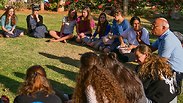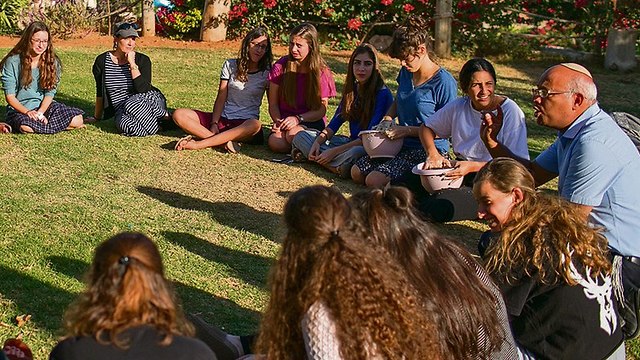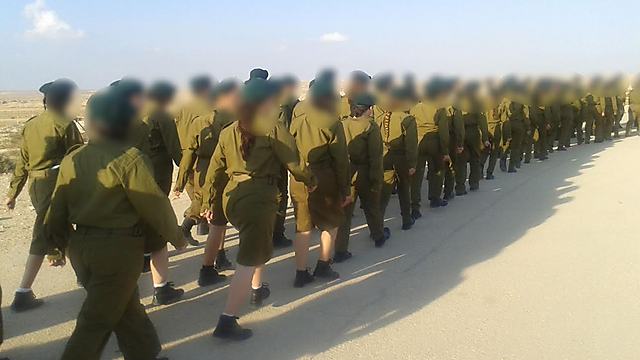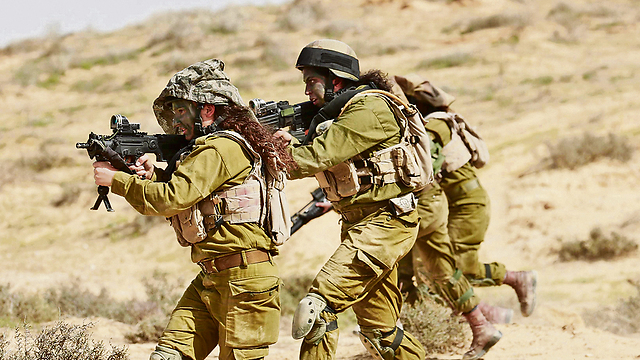
‘If you’ve already chosen to enlist, be prepared for it’
Leading rabbis have been issuing halachic rulings against their decision to join the IDF, their families don’t always understand their choice, but more and more religious girls are donning the uniform. Girls studying in the Lapidot Emunah pre-military academy discuss the difficulties they have been facing and explain why they know they are doing the right thing.
Leading rabbis like Shlomo Aviner have been issuing halachic rulings against drafting girls to the IDF, and an animated video produced by the Chotam organization, demonstrating how the army makes it difficult for religious girls to maintain the values they cherish, has become a viral hit.
I remember myself in the 12th grade, waiting for an interview for a pre-military academy. I really wanted to go to the academy, and on the eve of the interview it was the only thing I could think of. But that evening, a terrorist entered our home, the course of my life changed and I chose national service.
Thousands of religious girls face this crossroads every year. In a consistent trend, more and more of them choose to join the army. The idea of pre-military academies for religious girls is gaining momentum too, and there are two such academies today. On the backdrop of the row over girls’ enlistment, I visited one of them—Mechinat Lapidot Emunah—to see what was going on there.

I meet Rabbi Nir Yehuda, 46, of Ofra in Jerusalem. Together, we travel to the academy, which is located in the Sdeh Bar farm near the settlement of Nokdim. I wonder what made a rabbi in a famous girls-only high school get up one day and create an academy for religious girls, especially as leading rabbis in the religious sector oppose the idea.
“It began when I served as an educator in a big religious high school for girls,” he explains. “There was a girl there, she was actually the daughter of a prominent rabbi, who went to a mixed-gender academy, which obviously doesn’t suit every woman and every religious girl.
“Six months later, we had a Shabbat event for the school’s graduates. She visited me, and I asked how she was doing with God’s work. In response, she broke into tears. I wasn’t familiar with the world of academies at the time, but I realized there was an important need there, and together with friends we began developing the idea to create a pre-military academy.”
Rabbi Yehuda, by the way, would have liked to have sent his own daughters to the army, but they chose national service, and he respected their right to make their own decisions.
Children from the nearby Arab villages stand by the side of the road and wave. We drive around them, and my heart starts racing too. How did the students’ parents respond, I ask Rabbi Yehuda, both to the idea of studying in a pre-military academy and to the fact that the academy is located in a challenging area in terms of security?
“There are security procedures, and many of the parents are afraid in the beginning,” he admits. “But slowly, the parents visit the place themselves, and every year there are several mothers who say they would like to study here too,” the rabbi adds, smiling.
As we enter the academy, we are greeted by the laughter of 30 girls sitting down for lunch. They admit they didn’t cook the meal, but recommend that I stay for dinner, which they plan to prepare themselves.
Rintal Milo, the head of the seminary, has just arrived to meet the girls and see how they are. She gave birth five days ago and misses them already, and the girls are definitely excited.
I am taken by the familial feeling and the landscape of the Judea Desert landscape, and jokingly ask the rabbi if I can sign up too.
The academy has no defined area. It is made up of several caravans scattered around the farm. It’s quiet and there is something very calm in the air. Donkeys walk around freely.
Most of the day, the students study inside a seminary filled with books. There is a variety of Torah lessons and Zionism and social studies classes, as well as navigations and physical activity.
‘The army may give you some discipline’
Dana, Shachar and Anael are about to graduate from the academy and join the IDF. “I’m the third daughter in my family,” says Dana. “Although my two older sisters did national service, my entire family supports me. I studied at the Noga high school for girls in Beit Shemesh, and the school pushed me to study in the academy and to enlist.”
“We had a big commotion around the issue,” says Shachar, “because the girls-only high school doesn’t encourage enlistment, but a high percentage of the girls enlist. Their approach was that if we’re already enlisting, we should do something beforehand.”
“Our high school doesn’t encourage enlistment either,” says Adi. “In my family, we are eight siblings, and five girls did national service. It’s not that my parents encouraged me to enlist, but they did tell me to do what was best for me. I’m their daughter before being a soldier. Their approach was where would I make a greater contribution. My father had a bit more trouble accepting it.”
“My mother went to the army, so it has been pretty clear to me since I was a child that I would enlist,” says Shachar. “It took them time to understand the academy idea, but they accepted it.”
I think about my own mother, who served in the army too, and who I miss so much. When I weighed my options, she said somewhat seriously and somewhat jokingly: “Join the army. It may give you some discipline.”
I’m not surprised to hear that the fathers have more objections. It was the same for me and for Anael. When she starts talking, one can’t help but notice her delicate French accent. She emigrated from France and now lives in Ra’anana with her parents.
“In my family in France,” she says, “people always think that whoever enlists goes to combat service. For my father too, military means combat service. My parents were afraid that I would go to war, until I explained to them that I would be serving in front of a computer,” she laughs. “On the other hand, they really understood and supported the academy idea.”
The issue of women in combat service, not necessarily religious women, has been making headlines following a Yedioth Ahronoth report that women in the Armored Corps would be stationed on borders. Knesset Member Bezalel Smotrich (Bayit Yehudi) slammed the decision, saying cynically: “The woman in the tank will win. I’m not so sure the IDF will win.”
The combat service issue is raised in the academy too. The academy’s heads say they don’t encourage girls to seek combat roles, both for the physical reasons and due to the fact that maintaining a religious lifestyle in combat service is nearly impossible. “But if a girl chooses to go for a combat role, we won’t stop her, and we’ll provide her with every possible tool,” one of them stresses.
Is there really a difference between combat service and other roles, I ask the girls.
“Of course,” one of them says. “We don’t want to go to combat service. In combat service, it’s nearly impossible to maintain a religious lifestyle. Even a very strong-minded girl can roughen, and we prefer to go with what we care about.”
In general, all the girls I spoke to agree that if one decides to enlist, it’s important to prepare for the service beforehand. “That way, we’ll have the best foundation and there is less of a chance that the service will weaken us.”
40 percent become officers
Nitzanit Riklin from the settlement of Ma'ale Mikhmas runs the academy together with Rabbi Yehuda Nir. She is 50 years old, married, and a mother of three sons. What made her start the project?
“This academy was founded out of a feeling of responsibility after detecting needs,” she explains. “The approach was that if you’re already enlisting, be prepared for it.”
“We’re not a classic pre-military academy. It half feels like a seminary here,” Rabbi Yehuda adds. “Nevertheless, 40 percent of the academy students go on to become officers, and not because we push them to do so. There has never been a class here that pushes girls to become officers.”
How do you respond to halachic rulings issued by rabbis like Rabbi Aviner against girls’ enlistment with the IDF? How does it affect the girls in the academy?
“Rulings issued by leading rabbis are definitely undermining, and we hold discussions about them and raise more and more conflicts,” he admits. “However, Chotam’s viral clip against women’s enlistment has achieved the opposite result. It actually strengthened the girls’ desire to enlist and serve a full religious military service.”
“Our job is to ensure that every young religious woman fulfills her potential, whether in national or military service,” says Liora Minka, chairwoman of national-religious women’s movement Emunah. “We can’t ignore the considerable rise in the number of female recruits, and we should therefore provide them with all the possible tools to empower themselves. The goal is a proper two-year service, in which the girl enlisting will be able to maintain a religious lifestyle, and of course attention to any possible mishaps.”












